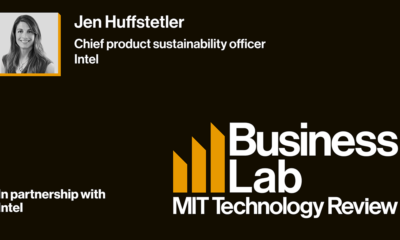Politics
Can AI bring God’s power to those in need?
Published
10 months agoon
By
Drew Simpson
The rise of AI has sparked both interest and trepidation in recent years. The Church is one sector that has been exploring the potential of AI as it continues to reshape numerous industries. The values and goals of faith are consistent with those of Gloo CEO and founder Scott Beck, who sees artificial intelligence as a tool for human flourishing. This article examines how artificial intelligence (AI) and the Christian faith intersect, with the goal of revealing how AI can be used for good.
Understanding what artificial intelligence is and how it works is necessary before exploring its possible uses in the Church. The term “artificial intelligence” (AI) is used to describe the study and creation of computer systems that mimic human intelligence. In order to make decisions or predictions, these systems are programmed to learn from data, identify patterns, and draw conclusions. Among the many methods that fall under the umbrella of artificial intelligence are machine learning, NLP, and CV.
Through his project “AI & the Church,” Scott Beck hopes to use artificial intelligence to improve people’s lives. The goal is to use AI to magnify God’s goodness, kindness, justice, compassion, and care. The scope of this effort extends beyond religious institutions to incorporate ministries like marriage enrichment, money management, career rehabilitation, and the promotion of positive mental health.
Helping people whose marriages or relationships are struggling is one of the most potent uses of AI in the Church. Artificial intelligence algorithms can direct couples who are considering divorce to religious marriage counselors who can help them strengthen their relationship through prayer, communication, and the application of biblical principles. Artificial intelligence (AI) can help couples find the counseling and support services they need to strengthen their relationships.
Suicide prevention and mental health care are two areas where artificial intelligence could have a profound impact. People who are depressed or having emotional problems frequently seek help from online resources. Artificial intelligence programs can analyze online communications and searches for terms that may indicate suicidal ideation or emotional distress. Artificial intelligence can quickly identify these signals and direct people in need to suicide prevention programs, relationship counseling services, or even local churches.
Timely intervention is necessary in cases of mental health crises. Artificial intelligence can be instrumental in helping people get the help they need by spotting warning signs. Artificial intelligence algorithms can immediately connect people experiencing mental health crises with local clergy or mental health professionals by analyzing their messages or online interactions for specific keywords. Rapid intervention can greatly improve a person’s chances of surviving a mental health crisis.
Eric Parks, senior pastor at Illinois’s Forest City Church, talks about why he’s excited about the Artificial Intelligence and the Church project. He gives high marks to AI for its ability to dissect sermons and come up with topics for group discussions. The pastor’s time is saved and the congregation is more involved in meaningful discussions thanks to this function. Parks also emphasizes the importance of timely connections for mental health crisis intervention, highlighting the potential of AI in reaching out to individuals struggling with emotional issues.
Even though AI could do amazing things for the Church, it’s important to think about the ethical implications of the technology. Extremely large data sets are used in AI systems’ learning processes, which can introduce biases and assumptions. It is essential that AI is developed in accordance with moral norms and religious values. It is the duty of those who create and program AI systems to direct their efforts toward the betterment of humanity and the fulfillment of God’s purposes.
Just like any other advanced technology, AI raises some valid concerns and questions. David Curry, CEO of Global Christian Relief, is concerned about the abuse of artificial intelligence and cites China’s use of facial recognition technology to persecute religious minorities as an example. He warns that artificial intelligence could be used to stifle free speech and violate human rights. To ensure AI is used ethically and in accordance with the principles of faith and justice, it is crucial to maintain vigilance and address these concerns.
Scott Beck argues that we should put our faith in the God who created us and the world, rather than in technological advancements. While AI has the potential to greatly improve many aspects of society, it is important to keep in mind that it has no inherent morality and that its usefulness is contingent on how it is designed and implemented. The Church should continue to emphasize the cultivation of faith, compassion, and love, using AI to amplify rather than replace these virtues.
It’s exciting to think about the ways in which artificial intelligence and the Church can work together to alleviate suffering and advance the common good. The Church can use AI to help with marriages, mental health, and other areas of life in a timely manner. However, we must proceed with caution when it comes to AI, making sure that its ethical use is in line with religious principles. Any technological advances made for the betterment of humanity should be grounded in faith in God.
First reported on Fox News
Frequently Asked Questions
1. What is the intersection between artificial intelligence and the Christian faith?
The intersection between artificial intelligence and the Christian faith lies in the belief that AI can be a tool for human flourishing and used to magnify God’s goodness, kindness, justice, compassion, and care. The Church sees AI as a means to improve people’s lives, promote positive mental health, and provide support in areas such as marriage enrichment and suicide prevention.
2. How can AI be used to strengthen marriages and relationships in the Church?
AI algorithms can help identify couples who are struggling in their relationships and direct them to religious marriage counselors who can offer support through prayer, communication, and the application of biblical principles. By analyzing online communications and searches for signs of emotional distress, AI can also connect individuals with relationship counseling services or local churches for timely intervention.
3. How can AI contribute to suicide prevention and mental health care in the Church?
AI programs can analyze online communications and searches for terms indicating suicidal ideation or emotional distress. By identifying these signals, AI can quickly direct individuals to suicide prevention programs, mental health services, or local clergy for support and intervention in cases of mental health crises.
4. What are the ethical implications of using AI in the Church?
The use of AI in the Church raises ethical concerns, particularly regarding data privacy, biases in AI systems’ learning processes, and potential misuse of the technology. It is essential to develop AI systems in accordance with moral norms and religious values, ensuring they are used ethically and for the betterment of humanity.
5. How should the Church approach the use of AI in conjunction with faith and values?
While AI has the potential to improve many aspects of society, the Church should maintain vigilance and ensure that its use aligns with principles of faith, compassion, and justice. The Church should emphasize the cultivation of faith and love, using AI to amplify these virtues rather than replace them. Any technological advances should be grounded in faith in God.
6. What concerns have been raised regarding AI’s potential misuse?
Some concerns include the misuse of AI for surveillance and the violation of human rights, as demonstrated by China’s use of facial recognition technology to persecute religious minorities. There are also worries about AI stifling free speech and the potential abuse of large data sets that may introduce biases and assumptions.
7. How can the Church work with AI to advance the common good?
The Church can utilize AI to address various challenges and alleviate suffering in areas like marriages, mental health, and social support. By integrating AI responsibly and ethically, the Church can harness its potential for positive impact while remaining grounded in faith and its values.
Featured Image Credit: Unsplash
Deanna Ritchie
Managing Editor at ReadWrite
Deanna is the Managing Editor at ReadWrite. Previously she worked as the Editor in Chief for Startup Grind and has over 20+ years of experience in content management and content development.
You may like
-


Four ways AI is making the power grid faster and more resilient
-


The power of green computing
-


China rolls out plan to boost computing power infrastructure
-


The power and paradox of X’s Community Notes
-


Why the dream of fusion power isn’t going away
-


Unlocking the Power of Financial Data: How Data Annotation Enhance Decision-Making
Politics
Fintech Kennek raises $12.5M seed round to digitize lending
Published
7 months agoon
10/11/2023By
Drew Simpson
London-based fintech startup Kennek has raised $12.5 million in seed funding to expand its lending operating system.
According to an Oct. 10 tech.eu report, the round was led by HV Capital and included participation from Dutch Founders Fund, AlbionVC, FFVC, Plug & Play Ventures, and Syndicate One. Kennek offers software-as-a-service tools to help non-bank lenders streamline their operations using open banking, open finance, and payments.
The platform aims to automate time-consuming manual tasks and consolidate fragmented data to simplify lending. Xavier De Pauw, founder of Kennek said:
“Until kennek, lenders had to devote countless hours to menial operational tasks and deal with jumbled and hard-coded data – which makes every other part of lending a headache. As former lenders ourselves, we lived and breathed these frustrations, and built kennek to make them a thing of the past.”
The company said the latest funding round was oversubscribed and closed quickly despite the challenging fundraising environment. The new capital will be used to expand Kennek’s engineering team and strengthen its market position in the UK while exploring expansion into other European markets. Barbod Namini, Partner at lead investor HV Capital, commented on the investment:
“Kennek has developed an ambitious and genuinely unique proposition which we think can be the foundation of the entire alternative lending space. […] It is a complicated market and a solution that brings together all information and stakeholders onto a single platform is highly compelling for both lenders & the ecosystem as a whole.”
The fintech lending space has grown rapidly in recent years, but many lenders still rely on legacy systems and manual processes that limit efficiency and scalability. Kennek aims to leverage open banking and data integration to provide lenders with a more streamlined, automated lending experience.
The seed funding will allow the London-based startup to continue developing its platform and expanding its team to meet demand from non-bank lenders looking to digitize operations. Kennek’s focus on the UK and Europe also comes amid rising adoption of open banking and open finance in the regions.
Featured Image Credit: Photo from Kennek.io; Thank you!
Radek Zielinski
Radek Zielinski is an experienced technology and financial journalist with a passion for cybersecurity and futurology.
Politics
Fortune 500’s race for generative AI breakthroughs
Published
7 months agoon
10/11/2023By
Drew Simpson
As excitement around generative AI grows, Fortune 500 companies, including Goldman Sachs, are carefully examining the possible applications of this technology. A recent survey of U.S. executives indicated that 60% believe generative AI will substantially impact their businesses in the long term. However, they anticipate a one to two-year timeframe before implementing their initial solutions. This optimism stems from the potential of generative AI to revolutionize various aspects of businesses, from enhancing customer experiences to optimizing internal processes. In the short term, companies will likely focus on pilot projects and experimentation, gradually integrating generative AI into their operations as they witness its positive influence on efficiency and profitability.
Goldman Sachs’ Cautious Approach to Implementing Generative AI
In a recent interview, Goldman Sachs CIO Marco Argenti revealed that the firm has not yet implemented any generative AI use cases. Instead, the company focuses on experimentation and setting high standards before adopting the technology. Argenti recognized the desire for outcomes in areas like developer and operational efficiency but emphasized ensuring precision before putting experimental AI use cases into production.
According to Argenti, striking the right balance between driving innovation and maintaining accuracy is crucial for successfully integrating generative AI within the firm. Goldman Sachs intends to continue exploring this emerging technology’s potential benefits and applications while diligently assessing risks to ensure it meets the company’s stringent quality standards.
One possible application for Goldman Sachs is in software development, where the company has observed a 20-40% productivity increase during its trials. The goal is for 1,000 developers to utilize generative AI tools by year’s end. However, Argenti emphasized that a well-defined expectation of return on investment is necessary before fully integrating generative AI into production.
To achieve this, the company plans to implement a systematic and strategic approach to adopting generative AI, ensuring that it complements and enhances the skills of its developers. Additionally, Goldman Sachs intends to evaluate the long-term impact of generative AI on their software development processes and the overall quality of the applications being developed.
Goldman Sachs’ approach to AI implementation goes beyond merely executing models. The firm has created a platform encompassing technical, legal, and compliance assessments to filter out improper content and keep track of all interactions. This comprehensive system ensures seamless integration of artificial intelligence in operations while adhering to regulatory standards and maintaining client confidentiality. Moreover, the platform continuously improves and adapts its algorithms, allowing Goldman Sachs to stay at the forefront of technology and offer its clients the most efficient and secure services.
Featured Image Credit: Photo by Google DeepMind; Pexels; Thank you!
Deanna Ritchie
Managing Editor at ReadWrite
Deanna is the Managing Editor at ReadWrite. Previously she worked as the Editor in Chief for Startup Grind and has over 20+ years of experience in content management and content development.
Politics
UK seizes web3 opportunity simplifying crypto regulations
Published
7 months agoon
10/10/2023By
Drew Simpson
As Web3 companies increasingly consider leaving the United States due to regulatory ambiguity, the United Kingdom must simplify its cryptocurrency regulations to attract these businesses. The conservative think tank Policy Exchange recently released a report detailing ten suggestions for improving Web3 regulation in the country. Among the recommendations are reducing liability for token holders in decentralized autonomous organizations (DAOs) and encouraging the Financial Conduct Authority (FCA) to adopt alternative Know Your Customer (KYC) methodologies, such as digital identities and blockchain analytics tools. These suggestions aim to position the UK as a hub for Web3 innovation and attract blockchain-based businesses looking for a more conducive regulatory environment.
Streamlining Cryptocurrency Regulations for Innovation
To make it easier for emerging Web3 companies to navigate existing legal frameworks and contribute to the UK’s digital economy growth, the government must streamline cryptocurrency regulations and adopt forward-looking approaches. By making the regulatory landscape clear and straightforward, the UK can create an environment that fosters innovation, growth, and competitiveness in the global fintech industry.
The Policy Exchange report also recommends not weakening self-hosted wallets or treating proof-of-stake (PoS) services as financial services. This approach aims to protect the fundamental principles of decentralization and user autonomy while strongly emphasizing security and regulatory compliance. By doing so, the UK can nurture an environment that encourages innovation and the continued growth of blockchain technology.
Despite recent strict measures by UK authorities, such as His Majesty’s Treasury and the FCA, toward the digital assets sector, the proposed changes in the Policy Exchange report strive to make the UK a more attractive location for Web3 enterprises. By adopting these suggestions, the UK can demonstrate its commitment to fostering innovation in the rapidly evolving blockchain and cryptocurrency industries while ensuring a robust and transparent regulatory environment.
The ongoing uncertainty surrounding cryptocurrency regulations in various countries has prompted Web3 companies to explore alternative jurisdictions with more precise legal frameworks. As the United States grapples with regulatory ambiguity, the United Kingdom can position itself as a hub for Web3 innovation by simplifying and streamlining its cryptocurrency regulations.
Featured Image Credit: Photo by Jonathan Borba; Pexels; Thank you!
Deanna Ritchie
Managing Editor at ReadWrite
Deanna is the Managing Editor at ReadWrite. Previously she worked as the Editor in Chief for Startup Grind and has over 20+ years of experience in content management and content development.
